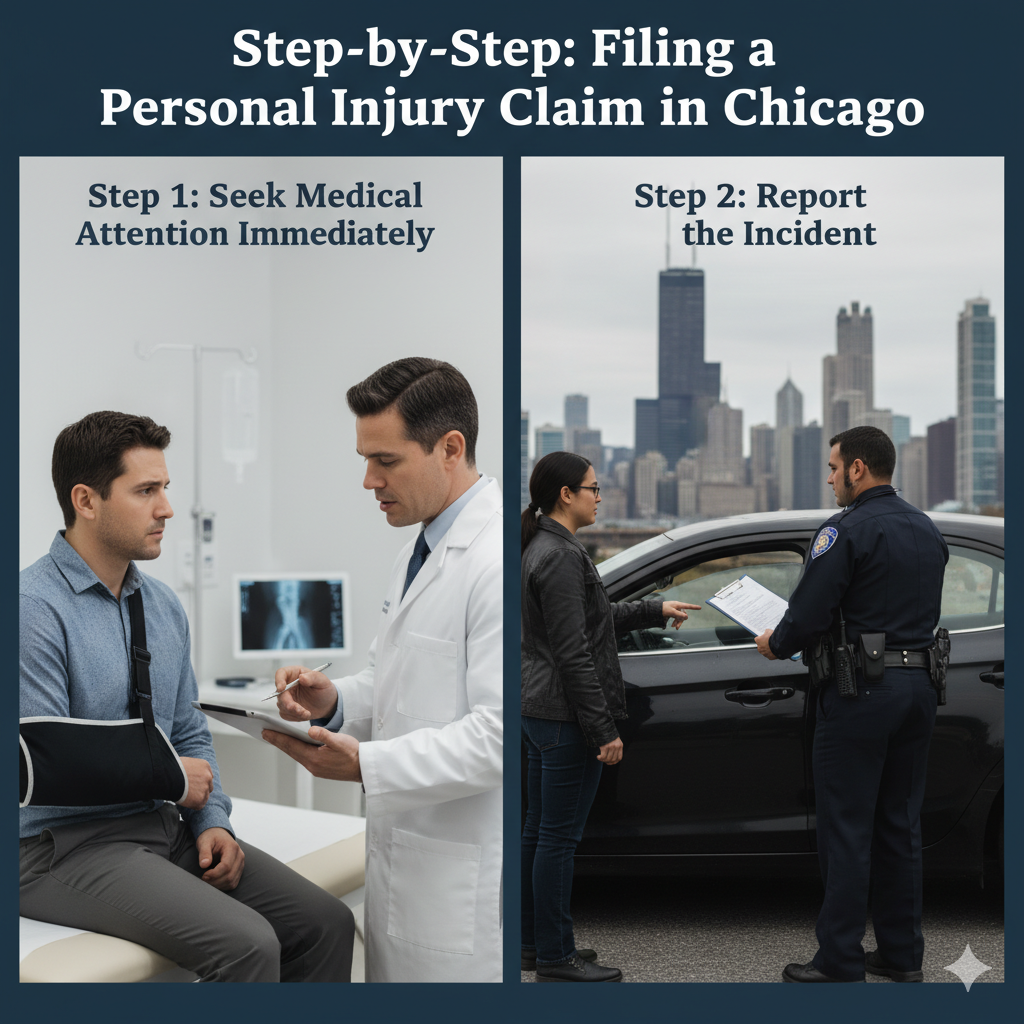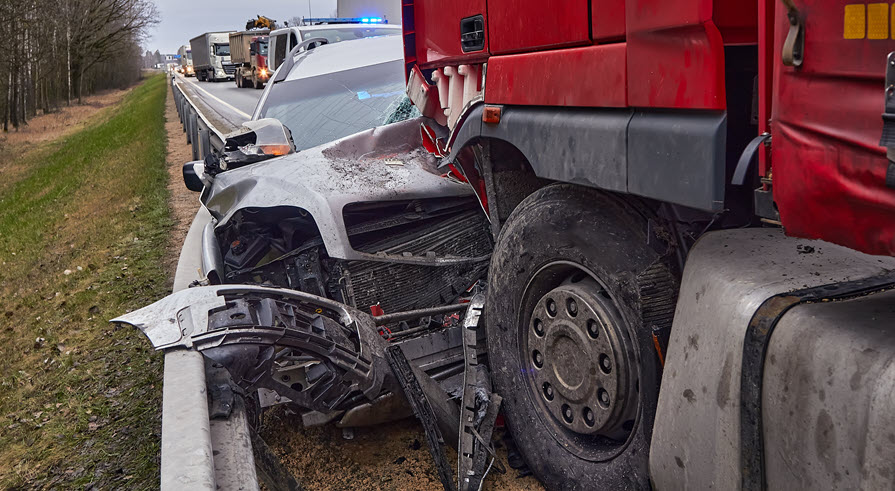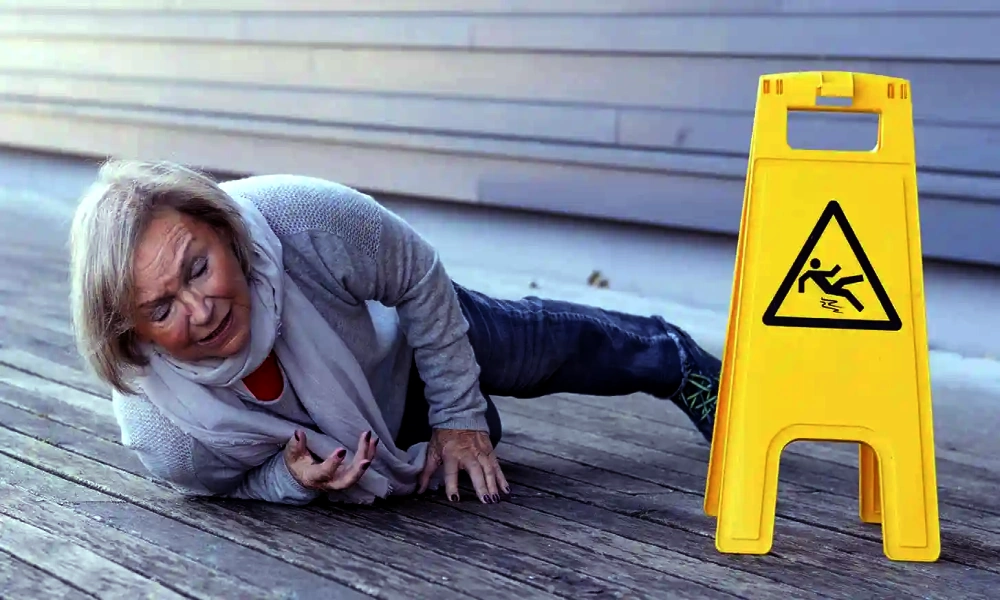Your Guide to Filing a Personal Injury Claim in Chicago: A Step-by-Step Process
Sustaining an injury due to someone else’s negligence can be a traumatic and confusing experience. On top of physical recovery, victims in Chicago are faced with a complex legal system. The process of filing a personal injury claim in Chicago can seem overwhelming, but it doesn’t have to be. By understanding the key steps involved, you can protect your rights and position yourself for the best possible outcome.
This guide provides a clear, step-by-step roadmap for navigating the personal injury claim process in Cook County, from the moments after your accident to the resolution of your case.
Step 1: Seek Immediate Medical Attention
Your health is the top priority. After any accident, see a doctor right away, even if you feel fine. Some serious injuries, like internal bleeding or traumatic brain injuries, have delayed symptoms. Seeking immediate medical care not only protects your well-being but also creates a crucial medical record that links your injuries directly to the accident. This documentation is vital when filing a personal injury claim in Chicago.
Step 2: Document Everything and Gather Evidence
The strength of your claim rests on the evidence you can provide. As soon as you are able, start documenting everything related to the accident and your injuries:
- Photos and Videos: Take pictures of the accident scene, your injuries, property damage, and any relevant conditions (e.g., a wet floor in a slip and fall).
- Police or Incident Report: Always file a report with the police or property owner. Obtain a copy of this report, as it is a key piece of evidence.
- Witness Information: Get the names and contact information of anyone who saw the accident. Their testimony can be invaluable.
- Keep a Journal: Document your daily pain levels, medical treatments, and how the injury impacts your daily life. This helps substantiate your claim for pain and suffering.
Step 3: Understand the Illinois Statute of Limitations
In Illinois, you have a limited time to file a lawsuit. This deadline is called the statute of limitations. For most personal injury cases, you havetwo years from the date of the injury to file a claim (735 ILCS 5/13-202). If you miss this deadline, you will likely lose your right to seek compensation forever. This makes it critical to act quickly after an accident.
Step 4: Consult with an Experienced Chicago Personal Injury Attorney
Before you speak to an insurance adjuster or sign any documents, consult with a qualified attorney. An experienced lawyer who specializes in filing personal injury claims in Chicago will:
- Evaluate the merits of your case for free.
- Explain your legal rights and options.
- Handle all communication with insurance companies.
- Accurately calculate the full value of your damages.
- Protect you from common tactics used by insurers to devalue your claim.
Step 5: The Pre-Litigation Phase: Investigation and Demand Letter
Once you hire an attorney, they will launch a full investigation into your accident. This involves gathering all evidence, including medical records, police reports, and witness statements. After you have completed your medical treatment (or reached maximum medical improvement), your attorney will draft a “demand letter.” This formal document is sent to the at-fault party’s insurance company, outlining the facts of the case, the legal basis for their client’s liability, and the total damages you are seeking.
Step 6: Negotiation and Settlement
The majority of personal injury claims are settled out of court. After the insurance company reviews the demand letter, a period of negotiation will begin. Your attorney will use their expertise to counter lowball offers and fight for a fair settlement that covers all your losses. If a satisfactory agreement can be reached, your case is resolved.
Step 7: Filing a Lawsuit and the Discovery Process
If the insurance company refuses to offer a fair settlement, the next step is formallyfiling a personal injury claim in Chicago’s court system (the Circuit Court of Cook County). This begins the litigation process. The first phase is “discovery,” where both sides exchange information. This may involve:
- Interrogatories: Written questions sent to the other party.
- Depositions: Oral testimony given under oath.
- Requests for Production: Formal requests for documents and other evidence.
Step 8: Mediation and Trial
Even after a lawsuit is filed, settlement is still possible. Many cases are resolved through mediation, a process where a neutral third party helps both sides reach a compromise. If mediation fails and no settlement is reached, your case will proceed to trial, where a judge or jury will hear the evidence and render a final verdict.
Personal Injury Legal Resources Across the U.S.
Navigating a personal injury claim requires expert guidance. Here are some established legal resources and firms in various states:
- Georgia: FindLaw Directory for Personal Injury Attorneys (Atlanta)
- Ohio: Kisling, Nestico & Redick (Akron)
- Colorado: The Sawaya Law Firm (Denver)
- Massachusetts: Sweeney Merrigan Law, LLP (Boston)
- Washington: Davis Law Group, P.S. (Seattle)
- New Jersey: The Grossman Law Firm, LLC (Freehold)
Conclusion: Take the Right Steps to Protect Your Future
The process of filing a personal injury claim in Chicago is methodical and requires careful attention to detail and deadlines. From seeking immediate medical care to potentially presenting your case at trial, each step is crucial. By understanding this process and partnering with a dedicated personal injury attorney, you can confidently navigate the legal system and focus on what matters most: your recovery.
Sources:
- Illinois General Assembly. (2025). 735 ILCS 5/13-202 – Illinois Compiled Statutes. Retrieved from ilga.gov.
- Circuit Court of Cook County. (2025). Rules of the Circuit Court of Cook County. Retrieved from cookcountycourt.org.
- American Bar Association. (2025). How the Civil Lawsuit Process Works.




